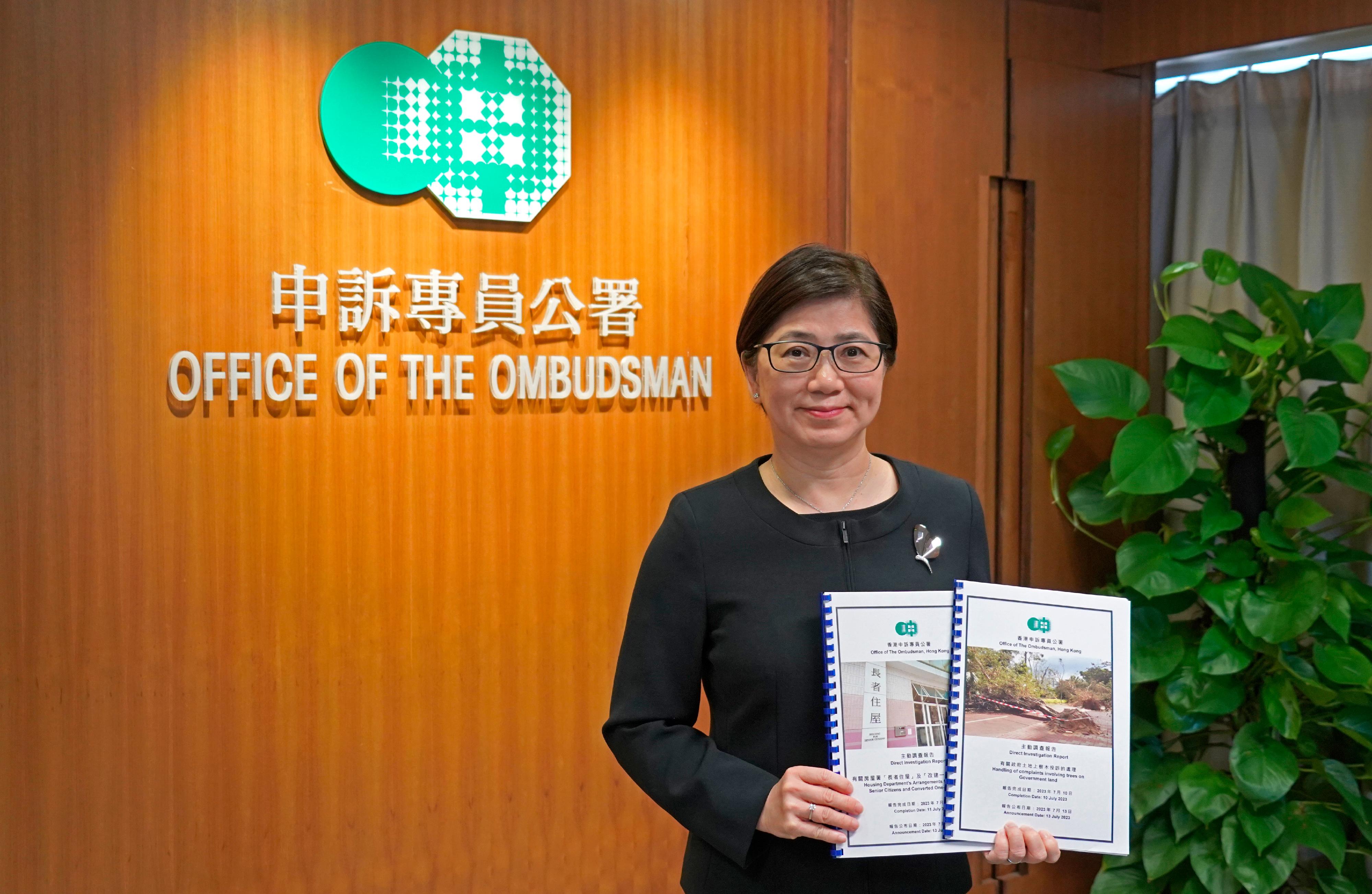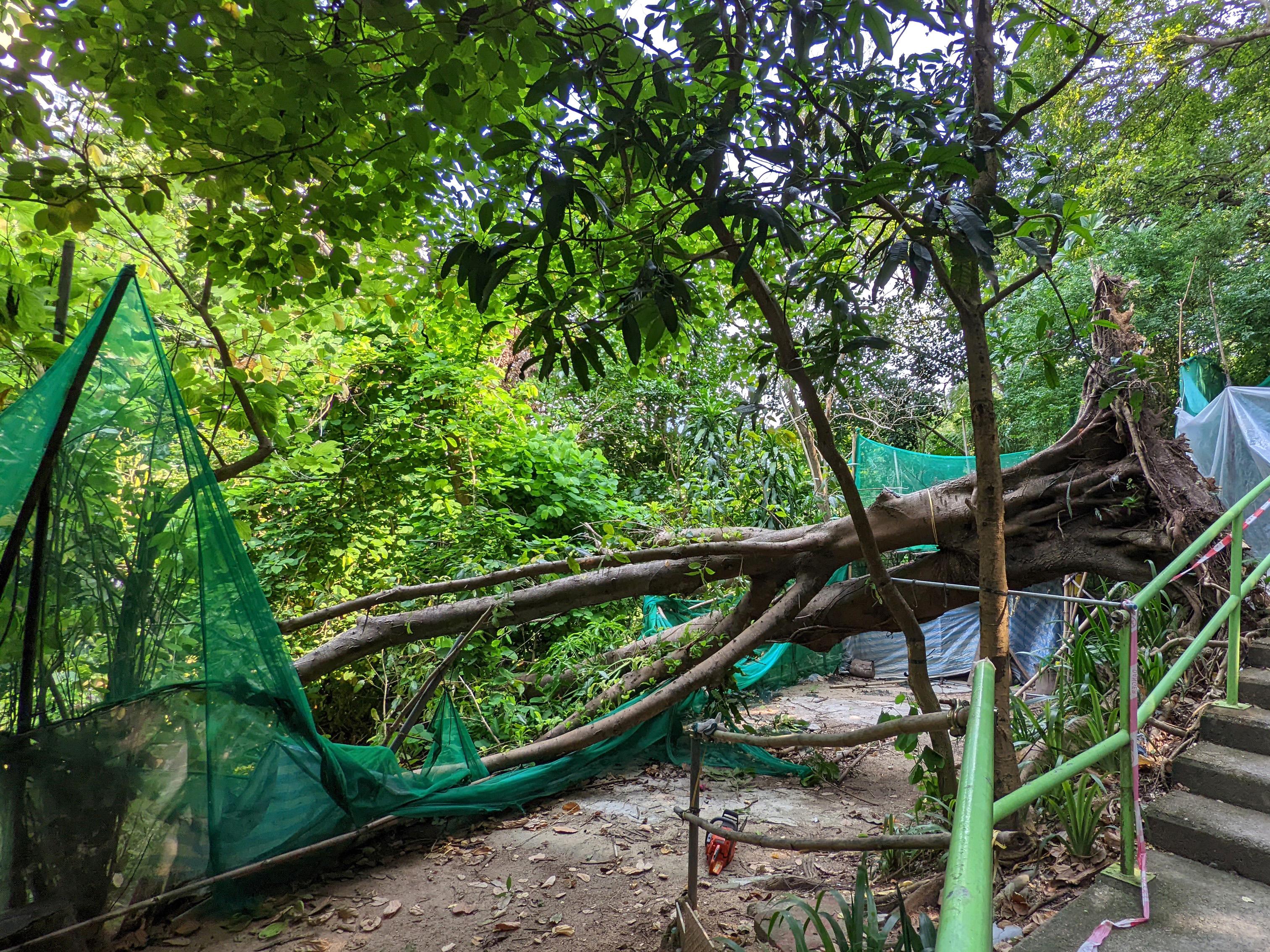Office of The Ombudsman announces results of direct investigation into handling of complaints involving trees on government land (with photos)
******************************************************************************************
The Ombudsman, Ms Winnie Chiu, announced at a press conference today (July 13) the completion of a direct investigation into the handling of complaints involving trees on government land, and made eight recommendations for improvement to the Tree Management Office (TMO) under the Development Bureau (DEVB).
The Government adopts an integrated approach for managing trees on government land, under which the department responsible for maintaining a Government facility or site takes care of the trees within the area. The DEVB has promulgated a Technical Circular that sets out the division of responsibilities among tree management departments. The TMO formulates comprehensive tree management strategies and measures for Hong Kong, and co-ordinates and supervises departments' handling of tree complaints at the central level.
Investigation by the Office of The Ombudsman found that between 2018 and October 2022, each year 1823 received on average some 24 000 tree complaints, of which about 1 100 cases on average (or 3.3 per cent to 5.9 per cent over the annual total of complaints received) involved disputes over responsibilities among departments. Each year, in dozens of such cases, a complainant received a reply only after more than three months. The TMO has established a mechanism under which it adjudicates on cases involving disputes over responsibilities. In some of the cases studied, when the TMO intervened in the disputes according to the mechanism, about four to six months had already lapsed since the cases were received. In early 2022, the TMO piloted an enhanced mechanism under which it would step in earlier to handle all cases that 1823 has taken to departmental complaint officers. Nevertheless, the cases might have been seriously delayed for different reasons when they were taken to the departmental complaint officers. This shows that if the TMO bases its decision to intervene solely on the complaint handling stage, the disputes may not be settled in a timely manner.
The Office's investigation also found that from time to time, there were divergent interpretations of the Technical Circular by departments and there was even recurrence of disputes over similar issues, and that some departments had failed to notify 1823 of their disagreement to take up a case within the specified time frame, or did not provide supplementary information in accordance with the mechanism. The overall progress of handling tree complaints was thereby affected.
Furthermore, none of the tree management departments has drawn up any internal time frame for carrying out ordinary tree work or set up any database recording the completion dates of tree work in response to complaints. Even if the departments have met their pledge in replying to the complainants, there is no objective information on whether they have actually carried out the tree work involved in the complaints in a timely manner.
Each month, 1823 submits to the TMO a report comprising multiple categories of data to facilitate the monitoring of the departments' handling of tree complaints. As regards tree complaints not received via 1823, the TMO currently only requires the departments to report the total number of tree complaints received each year with no other information or analysis. This reflects the TMO's relatively limited understanding of the departments' handling.
On the other hand, the Lands Department (LandsD) used to have a huge number of tree complaints with overdue replies. Since the second half of 2022, the TMO has strengthened the monitoring of tree complaint handling by the LandsD; the LandsD also set up an internal task force led by its Deputy Director to conduct a comprehensive review of the procedures for handling tree complaints. Improvement measures are being implemented progressively. Information showed that the backlog of cases has significantly shrunk. Nevertheless, the above only refers to cases in which the LandsD had delayed in issuing replies. The LandsD does not maintain figures on the actual number of tree complaints with clearance work to be completed. As such, there is no objective information on whether the trees involved in the backlog of complaint cases have been properly handled. The Office hopes that the LandsD can make good use of the computer information system it is developing as an internal monitoring tool to facilitate case follow-up and data analysis.
Ms Chiu said, "The Government receives a large number of tree complaints every year. If not promptly addressed, problematic trees may cause environmental nuisances or even pose potential hazards to public safety. The TMO under the DEVB co-ordinates and supervises departments' handling of tree complaints at the central level. Our investigation has identified room for improvement in the TMO's work, especially with regard to cases involving disputes over responsibilities. We are glad that in the course of our investigation, the TMO has implemented a series of improvement measures. We hope that the TMO can implement our recommendations promptly for more effective handling of tree complaints."
The Office's major recommendations made to the TMO under the DEVB include:
- for tree complaint cases involving disputes over responsibilities among departments, consider using the overall handling time of a case as a criterion for intervention, so as to reduce the risk of a problematic tree becoming an environmental nuisance or even a safety hazard due to delayed handling;
- conduct systemic analysis on completed complaint cases involving disputes over responsibilities, collate information about departments' common differences in opinions and misunderstanding and conduct exchanges and sharing with the departments regularly; review and update the content of the Technical Circular as appropriate in a timely manner by including the guiding principles from its decisions in previous cases for the departments to follow;
- supervise departments' strict compliance with the requirements of the interdepartmental mechanism in handling complaint referrals, i.e. they should raise a request to 1823 for further referral within the specified time frame and provide sufficient information if they disagree to take up a case. The TMO should also monitor the departments' compliance to ensure timely referral of complaint cases;
- require departments to formulate a time frame for carrying out ordinary tree work in response to complaints based on the actual need, and to report related data to the TMO regularly for monitoring to ensure proper handling of the tree problems under complaint;
- require departments to submit regularly data relating to tree complaints not received via 1823 for comprehensive monitoring of complaints received through various channels and follow-up actions by the departments; and
- continue to monitor LandsD's performance in handling tree complaints and provide assistance where necessary to ensure proper handling of problematic trees.
The DEVB has accepted all of the recommendations and is implementing them proactively.
The full investigation report has been uploaded to the website of the Office of The Ombudsman at www.ombudsman.hk for public viewing.
Ends/Thursday, July 13, 2023
Issued at HKT 12:30
Issued at HKT 12:30
NNNN






